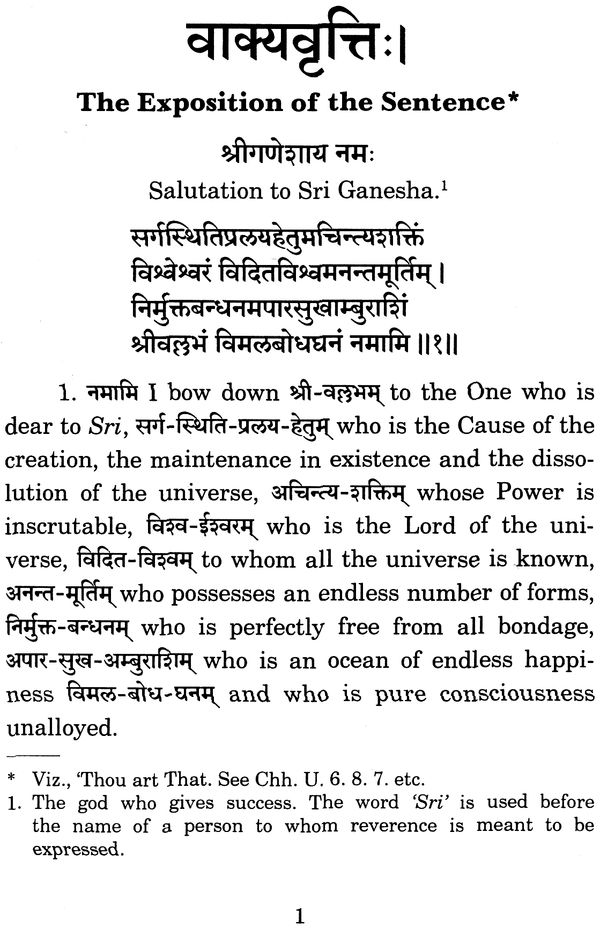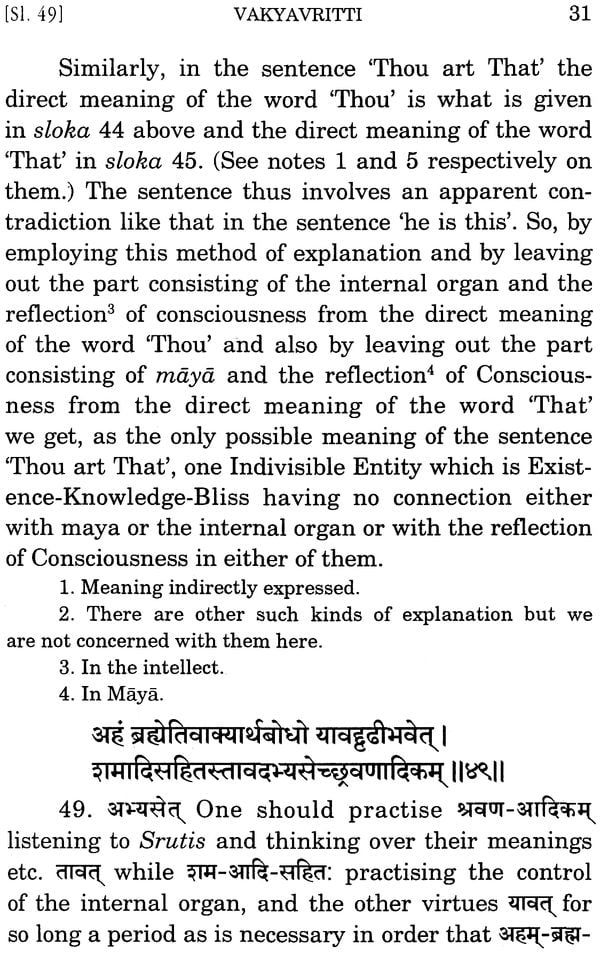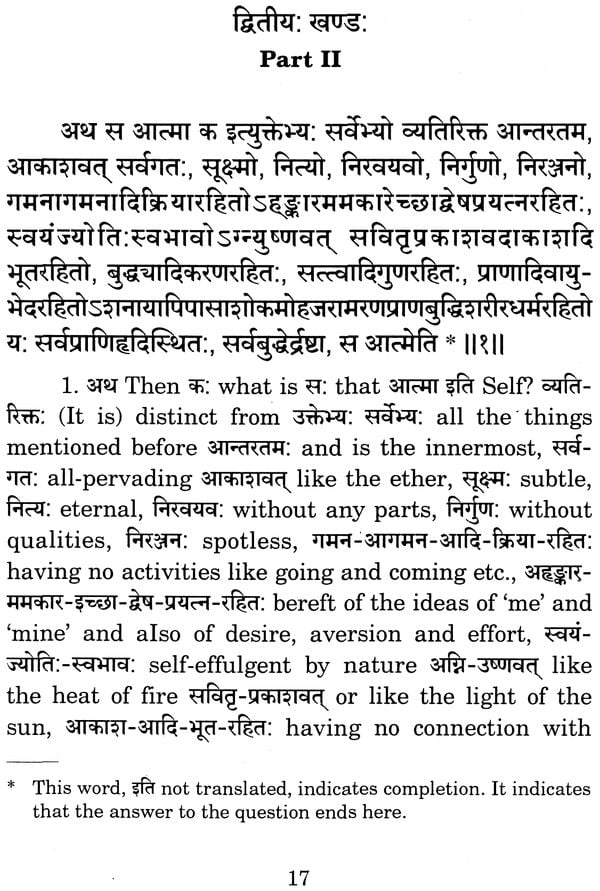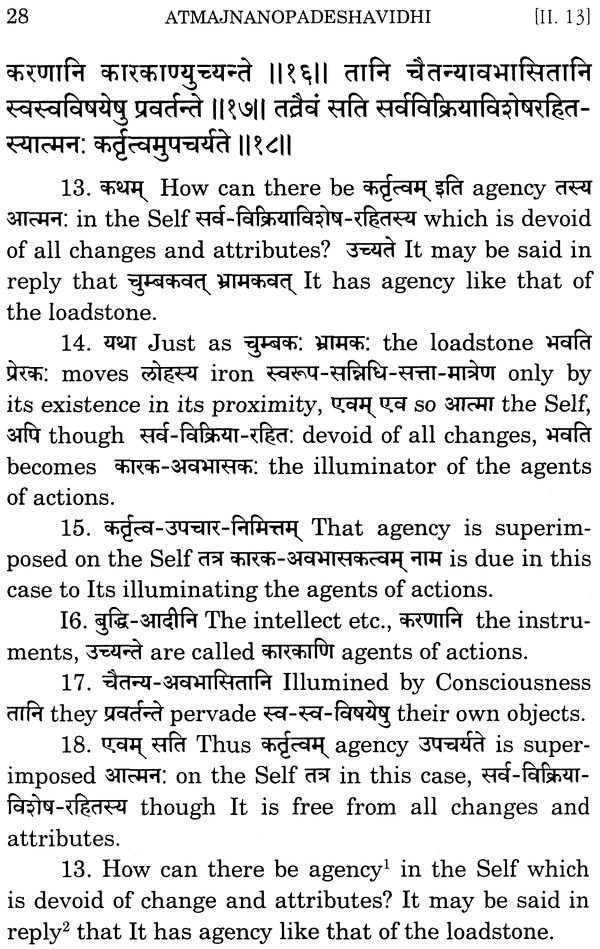
VAKYAVRITTI: of Sri Sankaracharya
Book Specification
| Item Code: | IDG910 |
| Author: | Swami Jagadananda |
| Publisher: | SRI RAMAKRISHNA MATH |
| Language: | Sanskrit Text with English Translation |
| Edition: | 2004 |
| ISBN: | 9788171208197 |
| Pages: | 51 |
| Cover: | Paperback |
| Other Details | 7.1" X 4.8" |
| Weight | 80 gm |
Book Description
Preface
The English translations of the two works of Sri Sankara, namely, the Vakyavritti, and the Atmajnanopadeshavidhi are offered to the public in the hope that they will be of help to beginners in understanding the fundamental theme of the Upanishads which preach the unity of the individual and the universal Self as also the falsity of the world of distinctions.
References to quotations and the explanations given in the notes will, it is hoped, facilitate the study of the texts. For the Explanatory notes in the Atmajananopadeshavidhi we are indebted to the commentator Anandagiri.
Our thanks are due to Prof. Mahendra Nath Sarkar for writing a foreword to the Vakyavritti and to Mr. V. Subrahmanya Iyer, Ex-Registrar, Mysore University, for going through the manuscript of the Atmajnanopadeshavidhi and offering valuable suggestions.
Translator
Foreword
I have been asked to write a foreword to the English Translation of the Vakyavritti by Swami of the Ramakrishna Order. The Swami is an erudite scholar who has the gift of intuition. His conviction is based upon science and realization. The translation has the stamp of a mind conversant with the thought and the art of the Advaita Vedanta.
The book is an illuminating work of Sankara, explaining the import of the axiom of identity, Tattvamasi. The axiom is the corner stone of the Vedanta. The book is especially meant for those who pursue the Vedantic discipline eventually to be established in the truth of identity and the ineffable Peace. The method is to develop an attitude of non-attachment and of witness to psychic functions. When the mental self is settled down, the Atman as innerscient is revealed. Towards the realization of the Supreme Puissance in the stillness of Being it is necessary to rise above the psychoses and to discriminate the silent self fromits dynamic trappings. A step further, the undivided consciousness freed from all local habitation and name emerges out in our vision.
The Advaita Vedanta does not entertain the least relation between Thou and That, or the least qualification of That by Thou. Thou art That is therefore, not a judgement, but the statement of the Supreme Fact. This brings out at once the distinction of interpretation put upon the axiom of identity by the two schools of the Vedanta.
The author has given the translation of the slokas, preceded by the English rendering of the component words, with expository footnotes in places requiring explanation. The translation is easy and felicitous. The books will intro duce this masterpiece of Sankara to the English-speaking race. The analytical contents and the index will be helpful to the readers in following the book.
Mahendra Nath Sarkar.
| Sloka 1 | Author's salutation to Brahman |
| Sloka 2 | His salutation to the Teacher |
| Sloka 3 | Qualities of the disciple making him fit for right knowledge |
| Sloka 4 | Disciple's eagerness for liberation |
| Sloka 5-6 | Knowledge of the oneness of the individual Self and the Universal Self arising from Upanishadic sentences like Thou and That leads to liberation |
| Sloka 7 | Disciple's inquiries about them |
| Sloka 8 | Teacher's answer. Individual Self in no other than Brahman |
| Sloka 9-10 | Understanding of sentences depends on knowledge of meanings of words in them |
| Sloka 11-27 | Meaning of the Word Thou', viz Existence-knowledge, Bliss the Witness of the internal organ and its modifications |
| Sloka 28-36 | Meaning of the Word That ', viz Existence-knowledge, Bliss, the Witness of Maya and all its modifications |
| Sloka 37-41 | Meaning of the sentences Thou art That viz., Indivisible Existence, Knowledge Bliss, Self-Brahman |
| Sloka 42-43 | The Sentences reveals what it means through the meanings of the words Thou and That indirectly expressed and rejects the two meanings directy expressed. |
| Sloka 44 | Direct meaning of the Word Thou |
| Sloka 45 | Direct meaning of the Word That |
| Sloka 46 | Meanings indirectly expressed accepted and not those directly expressed. The reason explained |
| Sloka 47 | Definition of the meanings indirectly expressed |
| Sloka 48 | Kind of indirectly expressed meanings accepted in sentences like "Thou and That" |
| Sloka 49 | Practise of virtues, such as self-control and study of the Srutis, necessary until firm understanding of the sentence I am Brahman |
| Sloka 50-53 | Mercy of Sruti and Teacher gives this firm conviction, making a man immediately liberated in this life and making him free from future births also. |









